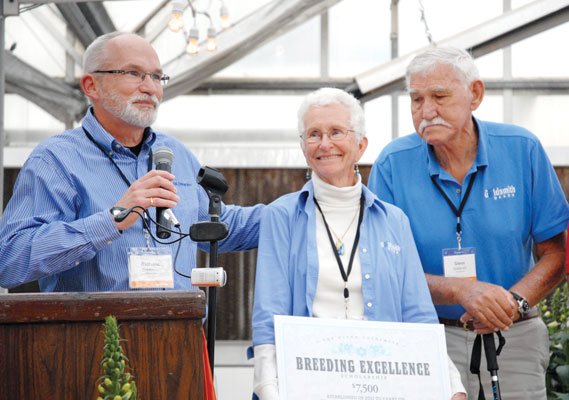Glenn Goldsmith recalled stories of his early plant breeding days at a Saturday tribute at Syngenta Flowers in Gilroy. The tribute commemorated 50 years of Goldsmith Seeds and the family’s commitment to the Rotary Club of Gilroy’s Service Above Self Award.
The ceremony also marked the creation of two scholarships for budding floriculturists. Glenn Goldsmith knew he wanted to devote his life to flowers at 6 years old.
After college, Glenn and Jane Goldsmith moved in 1962 to Gilroy with their children and rented a dusty greenhouse. The greenhouse was full of waist-high weeds. It was the middle of June, and it was hot. With a work crew of four little boys ages 4 to 9, Glenn and Jane started a flower breeding business.
From this, they built a seed empire.
Now retired, founder Glenn recalled stories of his early plant breeding days at a Saturday tribute at Syngenta Flowers in Gilroy. The tribute commemorated 50 years of Goldsmith Seeds and the family’s commitment to the Rotary Club of Gilroy’s Service Above Self Award. The award recognizes Rotarians who have rendered exemplary humanitarian service with an emphasis on personal volunteer efforts, according to its website.
The ceremony, which also was the first day of the 2011 California Spring Trials first organized by the family, marked the creation of two scholarships for budding floriculturists.
When Glenn first started his company, plant breeding was very different. Hybrids only existed in petunias.
“It was very easy,” he said at the ceremony after flying in from Hawaii with Jane. “Almost everything you did was better.”
The first varietal introduced by Goldsmith Seeds was “Bright Butterflies” snapdragons. That was 1966. Back then, snapdragons looked nothing like what they do today.
“They were weak, short, with three dull colors. I thought, ‘If this was big spikes and bright colors, they’d have real sell value.’ ”
Buying seeds of snapdragon varietals, he set to work.
The first generation looked normal.
From the second generation sample of 15,000 plants, Glenn selected 27 which had the characteristics he was looking for: strong color and strong spikes.
A pinch of these mixed seeds were mailed to the All American Selections, a annual plant breeding competition.
He won.
His “Bright Butterflies” snapdragons, that originally only existed in Glenn’s mind, was the company’s first of 22 All-America Selections award winners.
“We won that without ever seeing the product. Plant breeders wouldn’t dare do that today,” Glenn said.
In 2008, Goldsmith Seeds was sold to Syngenta, which kept the Goldsmith Seeds brand and retained the majority of their employees.
Joel Goldsmith, the company’s former CEO and current senior adviser for Syngenta’s Lawn and Garden Division, said Syngenta approached them with a good opportunity.
“We needed a partner to continue to grow and expand the business.”
At the height of Goldsmith Seeds, the company employed 4,000 people and had facilities in Holland, Guatemala and Kenya.
Even when the company grew large, Marketing Manager Jeannine Bogard said she thought of the company as a big family.
“We chose to work here. We were proud of what we did,” said Bogard, who has worked for Goldsmith Seeds since 1988.
Joel said Glenn sought out motivated and qualified employees.
Syngenta Plant Specialist Martyn Phillips said the family let qualified employees run with their ideas.
At the tribute, Joel told a story about one employee who was working on scarification, a technique that encourages germination by removing the hard outside layer of a seed pod.
One day, out of the corner of his eye, Joel saw a flash of light. He asked the employee, “What are you doing?”
The employee was experimenting with gunpowder and matches to remove the hard outside seed coat.
“We tried to create an environment where failure is comfortable, because that’s where success comes from,” Joel said.
The employee later came up with a process that worked for geraniums.
Phillips said the Goldsmith Family tended to hire motivated people, even if there wasn’t a job for them.
This happened to Phillips. When he approached the Goldsmith family for a job, the company was looking for a head plant specialist. Even though Phillips did not have enough experience for that position, he was brought on anyway. He eventually moved into a top plant fertility position.
Bogard said the Goldsmith family encouraged community involvement.
In 1997, Glenn received the Guatemalan Peace Medallion for contributing to Guatemala’s economic and social development. In 1978, the Rotary Club of Gilroy awarded Glenn the Service Above Self Award for his relief efforts after the 1976 Guatemala earthquake. The Goldsmiths have also been involved in the Gilroy Rotary Flower Fest, a Rotary fundraising staple.
At the tribute, Syngenta announced the creation of two $7,500 scholarships in honor of the Goldsmith family. These college scholarships will be awarded to two students, one working toward a degree in plant breeding and one for a degree in floriculture business advancement.
Acknowledging the scholarships, Jane said the family appreciated the scholarships.
“There couldn’t be a better gift.”














